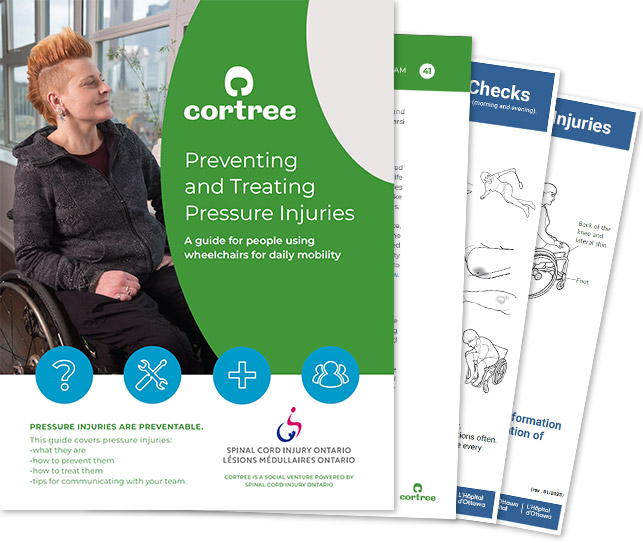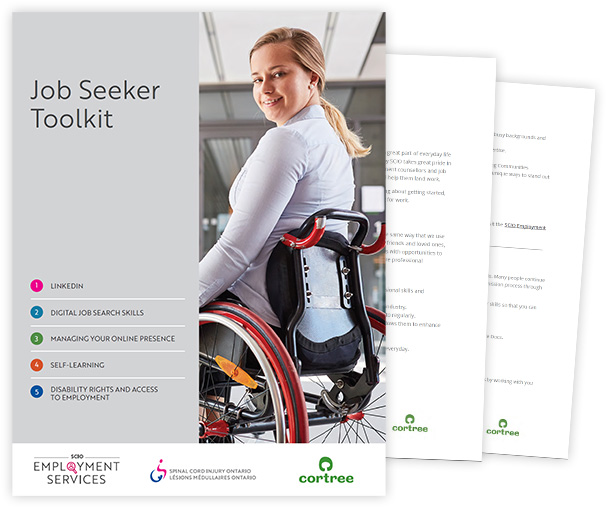Government Disability Benefits
There are a number of useful government disability benefits that are available for people living with disabilities in Canada. Understanding the different support services that are available is crucial to making use of these benefits. That’s why Cortree has gathered some key information to help you learn about the different government disability benefits that are available, as well as how to access them.
Table of Contents
- In Canada, What Government Disability Benefits are Available?
- What Determines Disability Eligibility in Canada?
- What Conditions Can be Considered Eligible for Disability Benefits?
- Understanding the Differences Between Government Disability Benefits in Ontario
- How to Apply for Government Disability Benefits in Ontario
- Has Covid Changed Disability Benefits in Canada?

In Canada, What Government Disability Benefits are Available?
Before discussing the specifics of each type of government disability benefits available in Canada, it’s important to note all the services that are available. This way, you can find the one most suited to assist with your personal needs.
In Canada, there are a variety of government disability benefits. The most accessible disability support programs include:
- Canada Pension Plan (CPP) Disability Benefits
- Disability Tax Credit (DTC)
- Child Disability Benefit (CDB)
- Ontario Disability Support Program (ODSP)
- Registered Disability Savings Plan (RDSP)
- Canada Disability Savings Grants and Bonds

What Determines Disability Eligibility in Canada?
While each form of government disability benefits has its own unique criteria for eligibility, there are some standard qualifications that are the same across most of the programs.
Other than the Child Disability Benefit (CDB), you must be 18 years of age or older in order to be eligible for government disability benefits.
Also, to be eligible for each of these government disability benefits, you must have a disability that is considered long-term, have an indefinite duration, or be considered potentially life-threatening. In many cases, disabilities are defined by the ODSP Act to help determine the impact it has on your day-to-day life.
What Conditions Can be Considered Eligible for Disability Benefits?
Rather than using specific disabilities as a standard for measuring eligibility for government disability benefits, your disability must prevent you from working any type of job regularly, or it must prevent you from participating in your community.
This can include a wide range of disabilities, with varying levels of severity. Some examples of conditions that are eligible for government disability benefits include:
- Chronic pain conditions
- Spinal cord injury (SCI)
- Heart disease
- Knee or joint disorders
- Bipolar mood disorder
- Back problems
- Lupus
- Chronic headaches or migraines
- Irritable bowel syndrome (IBS)
- Visual disorders or vision problems
- Psoriatic arthritis
- Fibromyalgia
- Crohn’s disease
- Chronic fatigue syndrome
- Vestibular disorders
- Lyme disease
- Carpal tunnel syndrome
- Multiple sclerosis
- Down’s syndrome
- Autism
- Complex regional pain syndrome
- Chronic or severe depression
- Neck and cervical disorders
- Sleep disorders
As you can see, the range of disabilities that qualify is quite broad, and this list is only a portion of the conditions that could meet eligibility requirements.

Understanding the Differences Between Government Disability Benefits in Ontario
While each form of government disability benefits available in Ontario requires that you have a disability to apply, they each also have unique criteria that must also be met, in order to be eligible.
There are three types of CPP Disability Benefits:
- Regular CPP Disability Benefits
- CPP Disability Post-Retirement Benefit
- CPP Disability Children’s Benefit
Each of these is given as a monthly payment to the recipient. However, these each have their own eligibility criteria that must be met. The major dividing factor between these three categories is age.
To be eligible for regular CPP Disability Benefits, you must be under 65 years of age.
CPP Children’s Benefit is for children 18 years old or younger (unless they are enrolled in school, in which case they can remain eligible until the age of 25).
The Post-Retirement Disability Benefit is only available for adults between the ages of 60 to 65. You must already be collecting the CPP Retirement Pension, and also meet the other regular CPP eligibility requirements. In order to access this program, you must apply to convert your CPP Retirement Pension into the CPP Post-Retirement Disability Benefit.
In addition to these, there are two types of CPP benefits for children with parents that have disabilities:
- Surviving Child’s Benefit – Monthly payments for the child of a deceased CPP contributor. To be eligible, the deceased must have made sufficient contributions to CPP before passing.
- Disabled Contributor’s Child’s Benefit – Monthly payments for the child of a person who is receiving CPP.
Rather than a monthly payment, the Disability Tax Credit (DTC) is a credit that can be applied to your income tax when you file at the beginning of each year.
The eligibility criteria for this benefit are somewhat different from the others. Your disability must have lasted or be expected to last continuously for at least 12 months, and must be present at least 90 percent of the time.
Additionally, if you meet these requirements, you must also:
- Be blind or have severe vision loss
- Require life-sustaining therapies
- Have a major restriction to at least one activity that’s considered essential and basic for daily living (i.e., eating, dressing, mobility, ambulation, continence management, etc.)
Unlike other forms of disability benefits, the Child Disability Benefit is typically applied to people who have a young dependent with a disability.
This could be for children under the age of 18, or students still enrolled in school between the ages of 18 and 25.
For a child to be eligible for the program, they must meet the criteria of both the Canada Child Benefit (CCB), as well as the Disability Tax Credit.
To be considered eligible for the DTC, a medical practitioner must certify and submit a Disability Tax Credit Certificate, which explains the severity and long-term nature of the child’s disability.
When services like the CPP Disability Benefits or Child Disability Benefit aren’t enough to assist you on your own, you may also be eligible for the Ontario Disability Support Program (ODSP). This is a monthly payment, similar to the CPP Disability Benefits. Unlike some of the other benefits, this government disability benefit is for Ontario residents only.
This service is considered a ‘program of last resort’, meaning that in order to be eligible, you must also have already requested access from all other available avenues, including:
- A job (if you can work)
- CPP Disability Benefits
- The Workplace Safety and Insurance Board (WSIB)
Due to the financial challenges that often face people with disabilities, saving money can be quite difficult. Thankfully, the Government of Canada is providing resources to help people with disabilities save money.
The Registered Disability Savings Plan (RDSP) is a savings plan designed to assist people with disabilities save for their futures.
The Canada Savings Grant is a matching grant, which means that the Government of Canada will contribute matching amounts to your RDSP. These grants are available up to 300 percent, which can assist substantially with saving.
The Canada Disability Savings Bond is only available for low or modest earning Canadians with disabilities. It could add a grant for as much as $1,000 to your RDSP.
In addition to all the other wide-reaching government disability benefits in Canada, there are some additional disability support resources available. These include:
- Education Funding – Financial grants, as well as services and equipment required for people with disabilities to attend school. This could also involve a specifically designed student loan program for people with disabilities
- Support for Veterans – Assistance provided for veterans who have a disability as a result of their time in service
- Federal Excise Gas Tax Refund – Income tax refunds for part of the tax paid on gasoline. Mobility impairments must be certified by a medical practitioner in order to apply
How to Apply for Government Disability Benefits in Ontario
Has Covid Changed Disability Benefits in Canada?
Many parts of our lives have changed over the last couple of years because of Covid. Luckily, disability benefits in Canada have not.
Eligibility and application procedures have not been affected by restrictions due to Covid-19. However, due to long-term closures of Service Canada locations across the country, accessing information and assistance with your application has been more challenging.
Sign up for Cortree today, and you’ll be able to access all the information and resources we have to offer. The useful information we provide can help you make sense of the wide array of government disability benefits available to you and how to access them.
Our helpful learning plans and training courses can also help make life more inclusive and accessible for you and your loved ones.

